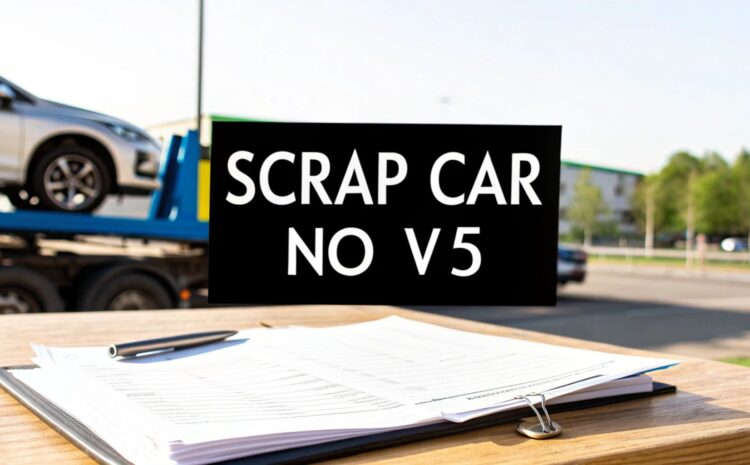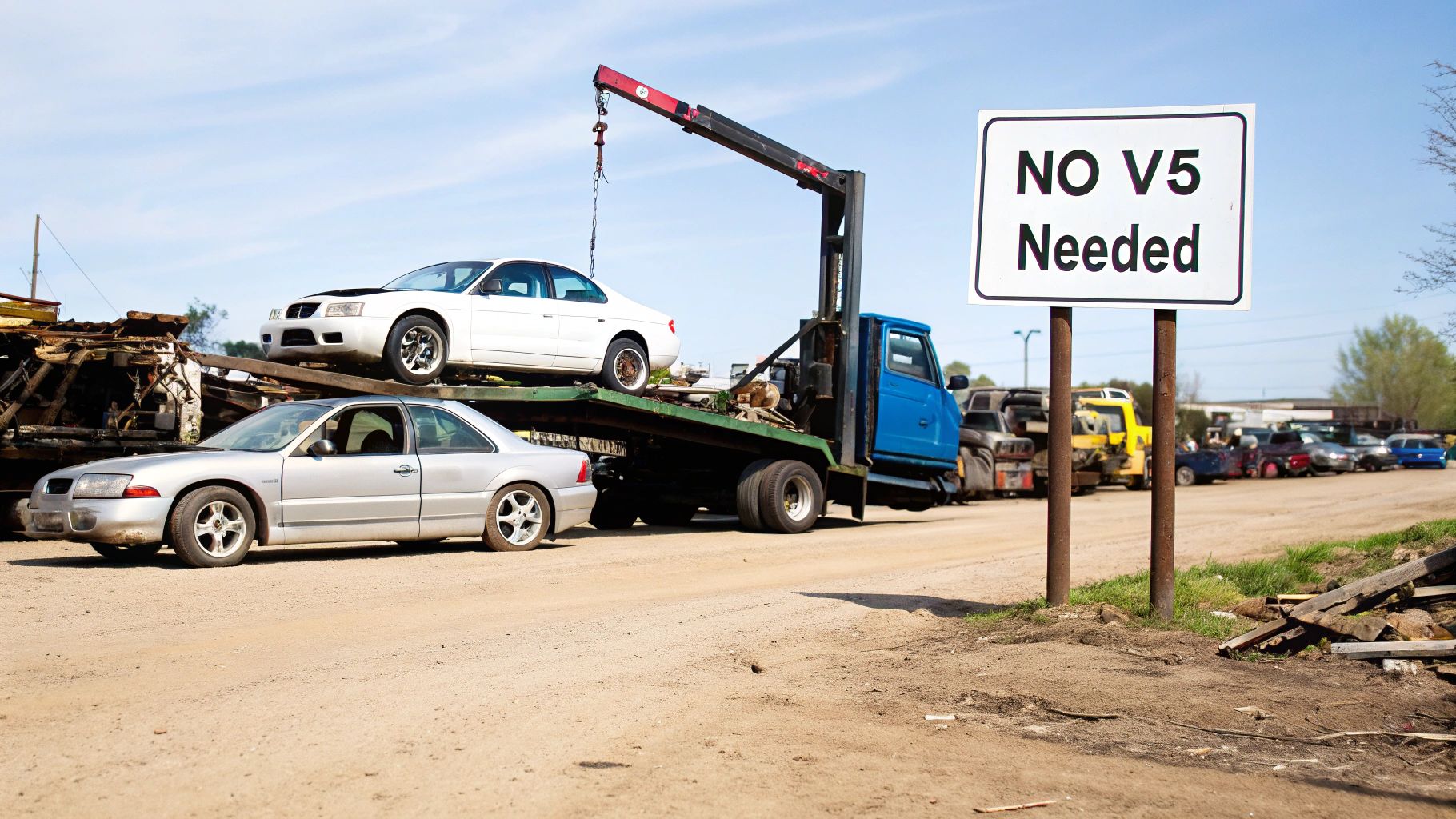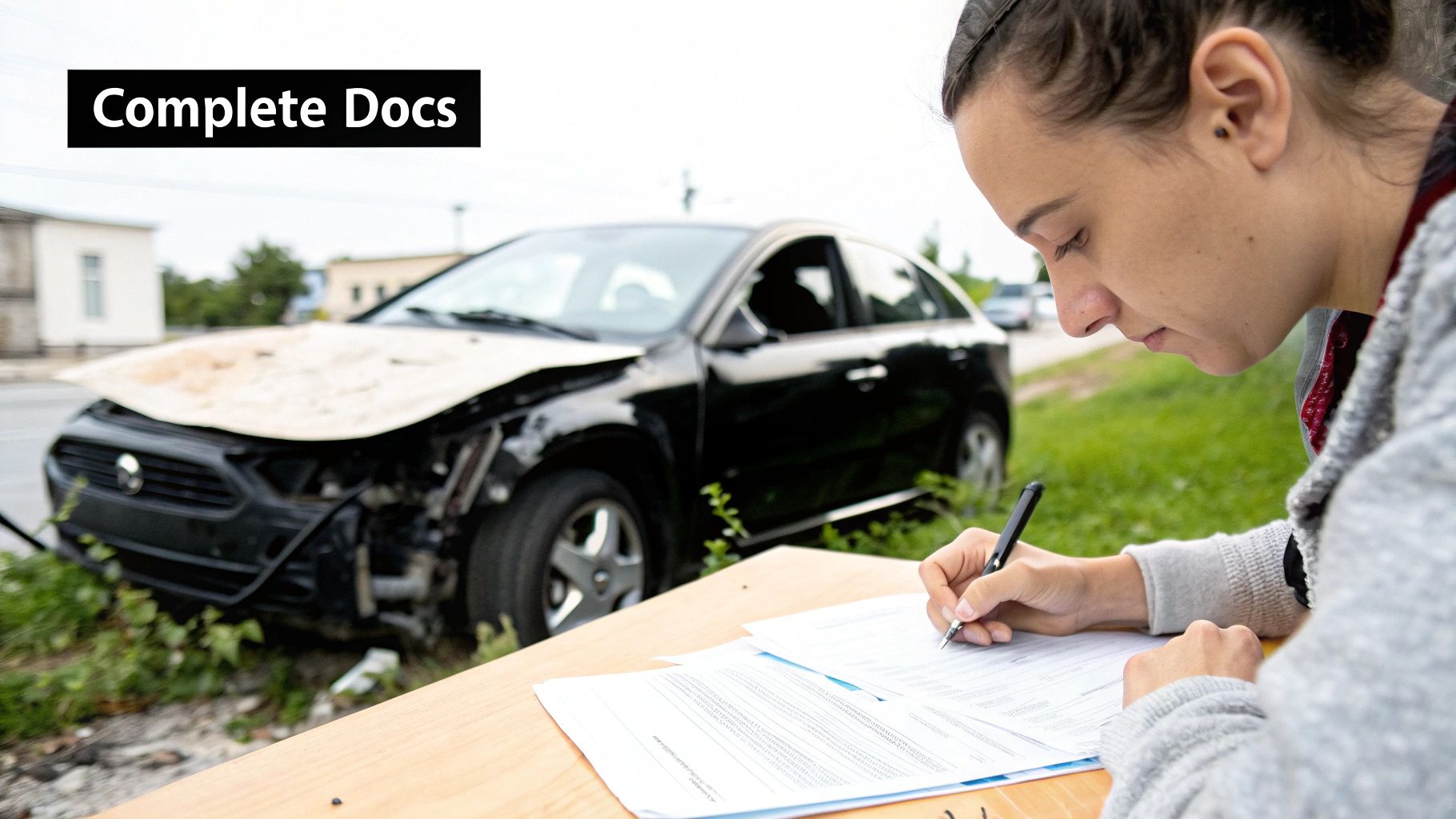
Scrap Car No V5: How to Legally Scrap Your Car hassle-Free
It's a surprisingly common worry we hear from car owners: "I've lost my V5C logbook, so now I'm stuck with this old car forever, right?" Let's put that myth to bed right now. You can absolutely scrap your car without it, and frankly, it's a much more straightforward process than you might think, provided you know who to deal with.
The secret isn't in finding some dodgy back-alley dealer, but in working with a properly licensed Authorised Treatment Facility (ATF). They are the only ones legally allowed to scrap vehicles, and they handle this exact situation every single day.
Yes, You Can Scrap a Car Without a V5 Logbook

The idea that a missing V5C is a complete roadblock is probably the biggest misconception in the scrap car industry. While the logbook is the gold standard for proving who owns a car, the DVLA has clear, established procedures for when it’s gone missing.
Think about it from the ATF's perspective. Their main legal and ethical duty is to make sure they aren't scrapping a stolen vehicle. As long as you can prove you are who you say you are and have a right to the car, they can proceed. They won't turn you away just because one piece of paper is missing.
What Do I Need Instead of a V5C?
So, if you don't have the logbook, what do you need? It’s refreshingly simple. Any legitimate scrap car service, like ours, will just need to see a couple of standard pieces of identification to verify your ownership.
Be ready to show them:
- Your Photo ID: A valid UK driving licence or passport is ideal.
- Proof of Your Address: A recent utility bill (gas, electric, council tax) or a bank statement works perfectly. It just needs to be dated within the last three months and show the same address as your photo ID.
That's it. This combination gives the ATF all the proof they need to move forward with the scrapping process legally and responsibly.
Here’s a quick comparison of the paperwork you'll need, showing how simple it is to use alternative documents if your V5C is missing.
Documents Needed With or Without a V5C
| Requirement | If You Have the V5C | If You Don't Have the V5C |
|---|---|---|
| Primary Document | The V5C (logbook) | Valid Photo ID (Passport/Driving Licence) |
| Supporting Document | Not usually required | Proof of Address (e.g., utility bill) |
| Responsibility | Give the V5C/3 slip to the ATF | Notify the DVLA in writing yourself |
As you can see, the process just shifts the responsibility slightly. It's designed to be flexible, not to penalise you for misplacing a document.
The Legal Side of Things
The reason the V5C is important is that it's part of the official DVLA process for taking a vehicle off the road. When you scrap your car, it needs to be de-registered. Handing over the V5C allows the ATF to handle this for you.
Without it, the process just changes slightly. You simply have to notify the DVLA yourself that you've scrapped the vehicle. It's just one extra letter to send, which we'll walk you through later in this guide. The key thing is that it doesn't stop the scrapping from happening. For more insights into how these official processes work, check out this overview from CarTakeBack.com.
The Bottom Line: Don't let a missing V5C logbook make you think your car is worthless or impossible to scrap. The system is built around proving your identity, not holding a specific bit of paper. A professional, licensed ATF will guide you through the process without any fuss.
So, how do you correctly scrap your car without its logbook? It's less about finding a loophole and more about following the proper, legal steps to ensure everything is above board and you're fully protected.
The first, and most crucial, step is to track down a licensed Authorised Treatment Facility (ATF). Don't even think about going anywhere else. These are the only facilities in the UK legally authorised by the Environment Agency to scrap vehicles.
Why is this so important? Because an ATF is your guarantee that the job is done right. They're the official gatekeepers who make sure every vehicle is properly depolluted and that its disposal is formally recorded. Dealing with a certified ATF is simply non-negotiable.
How to Inform the DVLA and Avoid Fines

Once your car has been collected by the Authorised Treatment Facility (ATF), it's easy to think the job is done. But there's one final, crucial step that falls squarely on your shoulders. You are legally required to tell the DVLA you've transferred your car to the motor trade. Getting this wrong can lead to some serious headaches.
This isn't something the ATF handles for you when you scrap a car with no V5. You remain the registered keeper—and legally responsible for the car—until the DVLA processes your notification. Forget this step, and you could face automatic fines, not to mention any future parking tickets, ULEZ charges, or speeding penalties tied to that registration plate.
Writing to the DVLA
So, how do you sort it out? It’s a bit old-school, but you need to send them a letter. This is your formal proof that the vehicle is no longer yours. When you don't have the V5C logbook, you can't use the online service or phone them up; it has to be done by post.
Your letter needs to have all the right details for the DVLA to update their records without a hitch. Be sure to include:
- Your full name and address (as it appears on the old V5C).
- The vehicle's registration number.
- The exact date you sold or transferred the car to the scrap yard.
- The full name and address of the ATF that collected it.
It's a simple list, but missing any piece of information can cause delays or even get your notification rejected, leaving you in a tricky spot.
Pro Tip: I always tell people to send this letter via recorded delivery. It only costs a few quid, but the receipt and tracking number you get are your golden ticket. If the DVLA ever says they didn't receive your letter, you have undeniable proof that you did your part.
A Simple Letter Template You Can Use
To make things as smooth as possible, here’s a template you can copy and adapt. Just pop in your details, print it, sign it, and send it off.
Your Full Name
Your Full Address
Date
DVLA
Swansea
SA99 1BD
Subject: Notification of Transfer for Vehicle – [Your Car’s Registration Number]
Dear Sir/Madam,
This letter is to inform you that I, [Your Full Name], the registered keeper of the vehicle with registration [Your Car’s Registration Number], have sold this vehicle to the motor trade.
The vehicle was transferred on [Date of Sale/Collection] to the following Authorised Treatment Facility:
[ATF Name]
[ATF’s Full Address]
As I do not possess the V5C registration certificate, I am notifying you of this transfer by letter.
Yours faithfully,
[Your Signature]
[Your Printed Name]
Here’s the rewritten section, crafted to sound like it was written by an experienced industry expert.
Why Using a Proper Authorised Treatment Facility is Non-Negotiable
When you need to scrap a car with no V5, picking the right place to take it isn't just a box-ticking exercise; it's the most crucial decision you'll make in the whole process. The only outfits legally permitted to handle end-of-life vehicles are Authorised Treatment Facilities, or ATFs.
They’re the only ones who can issue an official Certificate of Destruction (CoD). Think of the CoD as your get-out-of-jail-free card. It’s your concrete proof that the car is off the road for good and, most importantly, de-registered from the DVLA's records. Without that certificate, you're leaving yourself wide open to trouble. A shady operator could easily sell your old car on, and suddenly you’re the one getting parking tickets, speeding fines, or worse.
It's More Than Just a Crusher
People often picture a giant machine simply flattening cars, but what happens at an ATF is far more sophisticated. These are highly regulated environmental processing centres. Before any vehicle gets near the crusher, it goes through a detailed depollution process, all handled to strict UK environmental standards.
This means a specialist will carefully and safely remove:
- Every last drop of hazardous fluid – oil, brake fluid, coolant, you name it.
- The battery, with its lead and acid.
- All the tyres for separate recycling.
- Any older parts that might contain mercury.
This isn’t just about being green; it’s a legal requirement and a massive part of why the UK's vehicle recycling programme is so successful. These efforts have pushed reuse and recycling rates to an impressive 86.5% in 2025, with total recovery rates climbing to 94.1%. It’s a huge achievement built on years of work to cut down on landfill waste and emissions, a story well-documented in reports on scrap car recycling progress.
A quick takeaway: Using a verified ATF is the only way to guarantee the DVLA knows your car is scrapped. This officially ends your legal responsibility for it, full stop.
How to Spot a Genuine ATF
Thankfully, dodging the cowboys is pretty straightforward. Every single licensed ATF in the UK is listed on a public register managed by the Environment Agency. So, before you agree to anything, just ask the company for their licence number.
Armed with that number, you can pop over to the Environment Agency's website and check their public register. It only takes a minute. Any legitimate ATF will give you their details without hesitation—they’re proud of their status. If a collector gets cagey or can't produce a valid licence number, that's your cue to walk away. It's a massive red flag.
How Your Scrap Car Is Valued Without a V5C
Let's get one thing straight from the outset: missing your V5C logbook should make absolutely no difference to the price you’re offered for your scrap car. Any reputable Authorised Treatment Facility (ATF) worth its salt bases its valuation on real-world factors, not on whether you have a specific A4 document to hand.
The biggest factor by far is the car’s weight. It's simple, really. Heavier vehicles like big 4x4s, people carriers, or old transit vans contain a lot more metal. More metal means a higher value when it’s weighed in at the yard.
Your car's make and model only matter because they determine its overall size and weight. It's just common sense that a little Vauxhall Corsa will fetch less than a hefty Range Rover for this reason alone.
Keeping an Eye on Market Prices
The other piece of the puzzle is the day-to-day market rate for scrap metal, especially steel. This isn't a fixed price; it fluctuates based on global supply and demand, a bit like the stock market.
For example, tracking the industry data shows just how sensitive these prices can be. In early 2025, the average scrap car price was hovering around £227, but it dropped to a low of £220 by May, largely due to shifts in the international steel market. You can see a breakdown of these trends over at ATF Professional. This is precisely why getting a quote that's valid for that specific day is so crucial.
A fair offer comes down to just two things: the car's physical weight and the current market price for metal. If a company tries to knock money off because the V5C is missing, they're taking you for a ride.
Sometimes, just scrapping the vehicle isn't the only route to getting the best value. It might be worth exploring other options, so we’ve put together a guide on how a scrappage scheme works which could be a better fit for you.
Finally, a quick but important reminder: paying cash for scrap cars is illegal in the UK. The Scrap Metal Dealers Act 2013 put a stop to that years ago. A legitimate, trustworthy ATF will always pay you through a traceable bank transfer or a business cheque.
Your Top Questions Answered: Scrapping a Car Without the V5C
It's completely normal to have a few questions when you're doing something out of the ordinary, and scrapping a car without its logbook definitely falls into that category. Most people worry about hidden costs or frustrating delays. Let's clear those up right now.
We often hear from customers dealing with a scrap car no V5 situation, and the same concerns pop up time and again. Here’s what you really need to know, based on our years of experience.
Is it Worth Ordering a New V5C First?
Honestly, probably not. While you can certainly apply for a replacement V5C from the DVLA, it's going to cost you £25 and you'll be waiting up to five days for it to arrive by post.
If your only aim is to scrap the vehicle, that's just wasted time and money. Any professional Authorised Treatment Facility (ATF) is fully equipped to handle cars without a logbook. For them, it’s all part of a normal day's work.
Our Takeaway: Save yourself the hassle and the fee. Unless you need that V5C for another reason, the process for scrapping without one is perfectly legal, straightforward, and quicker.
Will I Get Less Money or Be Charged a Fee?
Absolutely not. A trustworthy ATF will never penalise you or charge an admin fee because you don't have the V5C. The price you're quoted is based on the car's weight and the going rate for scrap metal—the paperwork doesn't factor into it.
If a scrap company tries to knock money off their offer or sneak in a surcharge for a missing V5C, that's a massive red flag. Thank them for their time and find an operator who's playing by the rules.
What Happens If I Forget to Tell the DVLA?
This is the one step you absolutely cannot skip. If you don't officially inform the DVLA that the car has been scrapped, you remain the legally registered keeper in their eyes. That means any speeding tickets, parking fines, or even tax demands associated with that car will land squarely on your doormat.
Worse still, the DVLA can hit you with a fine of up to £1,000 for failing to notify them. It’s just one letter or online form, but it saves you from a world of potential trouble. For more answers to your questions, you can explore our full list of frequently asked questions to get even more clarity.
Ready to scrap your car in London or Surrey, with or without a V5C? Get a free, no-obligation quote from Fast Scrap Car today and see how easy it can be. https://fastscrapcar.co.uk
